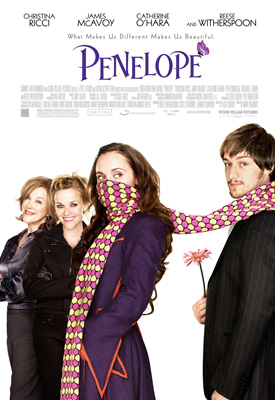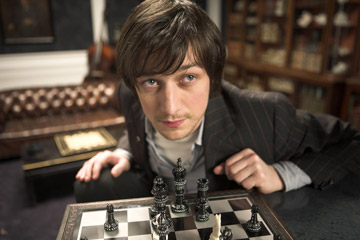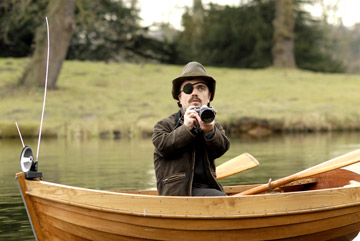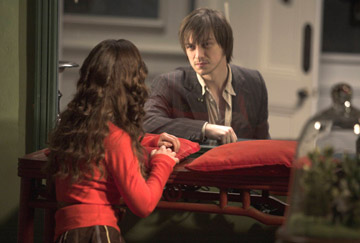Penelope

 The title character (Christina Ricci) is a young woman who was born to wealthy parents (Catherine O'Hara and Richard E. Grant) and seemed destined to have it all, if it weren't for the fact that her father's side of the family is cursed. It seems that years ago, her father's family angered a local witch, who placed a curse on them that the next woman born into their family would be born with the face of a pig. Indeed, Penelope was born with the snout and ears of a pig, and the curse can only be broken if she finds true love. Her parents have sheltered her from the outside world all this time, but this hasn't stopped them from trying to find a man for their daughter that can break the curse. Unfortunately, every guy who lays eyes upon her nose goes diving out the window in terror. (A visual gag that is cute the first time the movie uses it, but tiresome the 30th.) Penelope eventually decides to run away from home and experience the outside world, wrapping a scarf around the bottom part of her face to hide her abnormality. There might be someone out there who can break the curse, and that someone just might be Max (James McAvoy), a penniless piano player and gambler who initially is working for a sleazy tabloid photographer (Peter Dinklage) to snap a picture of the fabled and often rumored "pig girl", but starts to fall for her the more time he spends around her.
The title character (Christina Ricci) is a young woman who was born to wealthy parents (Catherine O'Hara and Richard E. Grant) and seemed destined to have it all, if it weren't for the fact that her father's side of the family is cursed. It seems that years ago, her father's family angered a local witch, who placed a curse on them that the next woman born into their family would be born with the face of a pig. Indeed, Penelope was born with the snout and ears of a pig, and the curse can only be broken if she finds true love. Her parents have sheltered her from the outside world all this time, but this hasn't stopped them from trying to find a man for their daughter that can break the curse. Unfortunately, every guy who lays eyes upon her nose goes diving out the window in terror. (A visual gag that is cute the first time the movie uses it, but tiresome the 30th.) Penelope eventually decides to run away from home and experience the outside world, wrapping a scarf around the bottom part of her face to hide her abnormality. There might be someone out there who can break the curse, and that someone just might be Max (James McAvoy), a penniless piano player and gambler who initially is working for a sleazy tabloid photographer (Peter Dinklage) to snap a picture of the fabled and often rumored "pig girl", but starts to fall for her the more time he spends around her. Despite the support of Hollywood star, Reese Witherspoon (who not only produced the film, but also has a small role as a woman who befriends Penelope after she heads out on her own), Penelope has been sitting on the studio shelf for a little over two years. My guess is the recent success of Disney's modern day fairy tale, Enchanted, inspired the studio to try its luck. Penelope is no Enchanted, however. This is a surprisingly dull and lifeless film that doesn't even seem interested in its own premise. Here is a movie that cries out for a light, funny, magical touch, but the pace of the final product on display is leaden and uninspired. It takes almost an hour for the story to finally reach the outside world, which means we have to sit through a good 50 minutes or so (and this is a 90 minute movie) of Penelope isolated in her own home, and the gag of people throwing themselves out the window or running away over and over for far longer than necessary. Even after the lead character finally sets out, and the movie looks like it's finally going to pick up, things remain the same. We never get to truly experience Penelope discovering the world, as most of this aspect of the story is pushed aside in music montages. The most we get is Penelope sitting in a bar, sipping a beer mug from a straw, so that no one can see what's beneath her scarf. A couple scenes later, her parents track her down, and send her back home. Here is a movie that could have been spirited and uplifting, but its so concerned with the mundane aspects, it never takes advantage of its own potential.
Despite the support of Hollywood star, Reese Witherspoon (who not only produced the film, but also has a small role as a woman who befriends Penelope after she heads out on her own), Penelope has been sitting on the studio shelf for a little over two years. My guess is the recent success of Disney's modern day fairy tale, Enchanted, inspired the studio to try its luck. Penelope is no Enchanted, however. This is a surprisingly dull and lifeless film that doesn't even seem interested in its own premise. Here is a movie that cries out for a light, funny, magical touch, but the pace of the final product on display is leaden and uninspired. It takes almost an hour for the story to finally reach the outside world, which means we have to sit through a good 50 minutes or so (and this is a 90 minute movie) of Penelope isolated in her own home, and the gag of people throwing themselves out the window or running away over and over for far longer than necessary. Even after the lead character finally sets out, and the movie looks like it's finally going to pick up, things remain the same. We never get to truly experience Penelope discovering the world, as most of this aspect of the story is pushed aside in music montages. The most we get is Penelope sitting in a bar, sipping a beer mug from a straw, so that no one can see what's beneath her scarf. A couple scenes later, her parents track her down, and send her back home. Here is a movie that could have been spirited and uplifting, but its so concerned with the mundane aspects, it never takes advantage of its own potential. The love story that is supposed to be at the center of Penelope is also curiously lacking, due to the fact that the romantic leads spend so little time together, and the few scenes they do spend together are completely dull and lifeless. We never get a sense that a real relationship is building between the two, not only because the movie gives them nothing to do together, but they come across as complete opposites in terms of performances. Christina Ricci is plucky and likable in her portrayal of Penelope, so much so you wish her performance was inhabiting a better movie. James McAvoy, on the other hand, is a lifeless bore, who never comes across as anyone the audience can get behind. Not even the usually reliable Catherine O'Hara can escape from the film's sloppy writing. Her performance as Penelope's mother runs the range of being sympathetic and sweet, to being a screaming harpy who is insensitive and shrill. Her character fits whatever the story requires her to be, so sometimes she comes across as being sensitive to her daughter, and sometimes she is treated as the villain. Her relationship with her husband, and the strain the curse must have placed on their relationship all these years, is also completely ignored. It's ignored so much, Richard E. Grant may as well have not even bothered to show up as her father, as he's given little dialogue, and even less to do with anything that happens in the movie itself.
The love story that is supposed to be at the center of Penelope is also curiously lacking, due to the fact that the romantic leads spend so little time together, and the few scenes they do spend together are completely dull and lifeless. We never get a sense that a real relationship is building between the two, not only because the movie gives them nothing to do together, but they come across as complete opposites in terms of performances. Christina Ricci is plucky and likable in her portrayal of Penelope, so much so you wish her performance was inhabiting a better movie. James McAvoy, on the other hand, is a lifeless bore, who never comes across as anyone the audience can get behind. Not even the usually reliable Catherine O'Hara can escape from the film's sloppy writing. Her performance as Penelope's mother runs the range of being sympathetic and sweet, to being a screaming harpy who is insensitive and shrill. Her character fits whatever the story requires her to be, so sometimes she comes across as being sensitive to her daughter, and sometimes she is treated as the villain. Her relationship with her husband, and the strain the curse must have placed on their relationship all these years, is also completely ignored. It's ignored so much, Richard E. Grant may as well have not even bothered to show up as her father, as he's given little dialogue, and even less to do with anything that happens in the movie itself.
See the movie times in your area or buy the DVD at Amazon.com!






0 Comments:
Post a Comment
<< Home